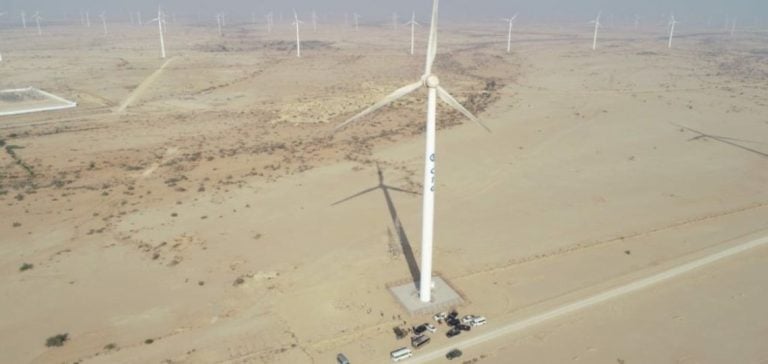Canadian renewable energy developer JCM Power wins a 240 MW hybrid project in the Dhabeji region, near Karachi, Pakistan.
The project combines wind and solar power to supply electricity to K-Electric, one of the main players in Pakistan’s energy network.
With a bid of $0.031/kWh, one of the most competitive prices in the region, JCM Power is positioning itself as a key player in the modernization of the country’s energy mix.
The integration of this hybrid project marks an important milestone for Pakistan, whose objective is to increase the share of renewable energies in its power grid. Faced with a growing demand for electricity, particularly in urban areas such as Karachi, the addition of wind-solar hybrid power will help to diversify supply sources.
It will also help to stabilize the grid by offering more continuous production throughout the day.
A hybrid approach tailored to local needs
The choice of a hybrid project combining wind and solar power meets the specific needs of Pakistan, where fossil fuels still largely dominate production.
By integrating these two complementary sources, JCM Power maximizes energy production, thus optimizing the availability of electricity.
Solar power provides significant production during the day, while wind power takes over at night, guaranteeing a more regular supply for K-Electric, particularly during peak periods.
The 240 MW capacity reinforces a network that often struggles to cope with summer consumption peaks.
Despite its growing economic dynamism, Pakistan is still heavily dependent on imported fossil fuels, the cost of which fluctuates.
This dependence weighs on electricity prices and limits investment capacity for more sustainable projects.
By moving towards hybrid solutions, the country is beginning a transition to more affordable sources in the long term.
K-Electric and energy sector regulation
K-Electric, as the main electricity distributor in the Karachi region, is looking to diversify its energy sources to improve the reliability of its network.
Power cuts are frequent, especially in summer, when demand for air conditioning soars.
This project, the largest in K-Electric’s portfolio, is a direct response to this lack of capacity.
The project was supervised by the National Electric Power Regulatory Authority (NEPRA), which ensured the transparency of the tendering process.
NEPRA plays a central role in the regulation of Pakistan’s energy sector, ensuring that large-scale projects such as this are awarded according to competitive criteria and international standards.
NEPRA’s winning bid is significant in terms of price: $0.031/kWh represents one of the lowest prices for a project of this scale, underlining the competitiveness of solar and wind technologies.
Strategic partnerships and local expertise
JCM Power is not alone in this venture.
The company has forged partnerships with local players such as Burj Capital and Gharo Solar Limited, two companies specializing in infrastructure and renewable energy development.
These collaborations ensure the local expertise needed to implement projects of this scale.
Burj Capital’s experience in renewable energy projects in Pakistan, combined with JCM Power’s technical skills, creates a dynamic that will enable the project to be completed on schedule.
Gharo Solar Limited, for its part, brings its knowledge of local conditions, guaranteeing optimal integration of the solar park into the Pakistani regulatory and environmental framework.
These partnerships also reduce the risks associated with infrastructure management and land issues, facilitating the smooth running of the project.
Economic and environmental issues
This project is part of a wider drive to decarbonize energy in Pakistan.
The country, whose electricity production is still largely based on thermal power plants, benefits from the addition of this type of project to achieve its energy objectives.
Hybrid power will enable the country to reduce its dependence on imported coal and natural gas, while cutting production costs.
The production cost of $0.031/kWh directly benefits consumers by offering energy at a more competitive price than traditional thermal power plants.
This could also alleviate the tariff pressure often pointed at in Pakistan, where electricity prices represent a major economic issue.
In the future, such hybrid projects will become essential in developing countries seeking to adopt renewable technologies to meet their growing energy demand without worsening their environmental impact.
Outlook for the renewable energies sector
This project illustrates the potential of hybrid renewable energies in Pakistan, particularly in high-density urban areas such as Karachi.
The Pakistani government’s objectives for diversifying the energy mix call for an increasing contribution from renewable energies, with a target of 30% by 2030.
Projects such as this one help to meet these targets, while strengthening the resilience of the national power grid.
The hybrid project model offers a solution tailored to local realities, reducing supply variability and maximizing renewable production.
This represents a strategic turning point for K-Electric and Pakistan, marking a concrete commitment to a sustainable energy transition, based on local resources and mature technologies.






















